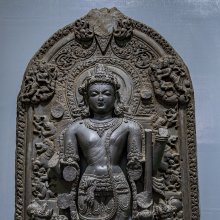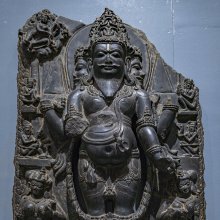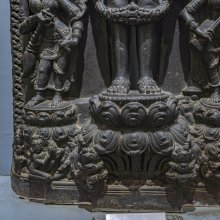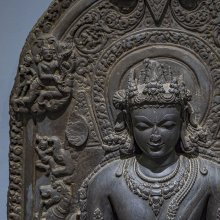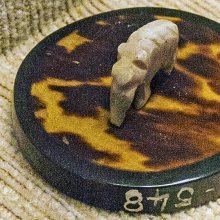Bara, Barā: 15 definitions
Introduction:
Bara means something in Hinduism, Sanskrit, the history of ancient India, Marathi, Jainism, Prakrit, Hindi, biology. If you want to know the exact meaning, history, etymology or English translation of this term then check out the descriptions on this page. Add your comment or reference to a book if you want to contribute to this summary article.
Alternative spellings of this word include Bar.
Images (photo gallery)
(+6 more images available)
In Hinduism
Ayurveda (science of life)
Rasashastra (Alchemy and Herbo-Mineral preparations)
Source: Wisdom Library: Rasa-śāstraBarā (बरा):—One of the sixty-seven Mahauṣadhi, as per Rasaśāstra texts (rasa literature). These drugs are useful for processing mercury (rasa), such as the alchemical processes known as sūta-bandhana and māraṇa.

Āyurveda (आयुर्वेद, ayurveda) is a branch of Indian science dealing with medicine, herbalism, taxology, anatomy, surgery, alchemy and related topics. Traditional practice of Āyurveda in ancient India dates back to at least the first millenium BC. Literature is commonly written in Sanskrit using various poetic metres.
India history and geography
Source: Cologne Digital Sanskrit Dictionaries: Indian Epigraphical GlossaryBāra.—(EI 13), Telugu; the distance between the ends of out-stretched arms. Note: bāra is defined in the “Indian epigraphical glossary” as it can be found on ancient inscriptions commonly written in Sanskrit, Prakrit or Dravidian languages.

The history of India traces the identification of countries, villages, towns and other regions of India, as well as mythology, zoology, royal dynasties, rulers, tribes, local festivities and traditions and regional languages. Ancient India enjoyed religious freedom and encourages the path of Dharma, a concept common to Buddhism, Hinduism, and Jainism.
Biology (plants and animals)
Source: Google Books: CRC World Dictionary (Regional names)1) Bara in Africa is the name of a plant defined with Pennisetum pedicellatum in various botanical sources. This page contains potential references in Ayurveda, modern medicine, and other folk traditions or local practices It has the synonym Eriochaeta reversa Fig. & De Not. (among others).
2) Bara in Burkina Faso is also identified with Sarcocephalus latifolius It has the synonym Nauclea latifolia Sm. (etc.).
3) Bara in India is also identified with Ficus benghalensis It has the synonym Ficus cotoneaefolia Vahl (etc.).
4) Bara is also identified with Sorghum halepense It has the synonym Andropogon halepensis subsp. anatherus Piper (etc.).
5) Bara in Mali is also identified with Pennisetum polystachion It has the synonym Panicum longisetum Torr. (etc.).
6) Bara in Senegal is also identified with Combretum micranthum It has the synonym Bureava crotonoides Baill. (etc.).
7) Bara in Yoruba is also identified with Citrullus colocynthis It has the synonym Cucumis colocynthis L. (etc.).
8) Bara is also identified with Citrullus lanatus It has the synonym Cucumis vulgaris (Schrad. ex Eckl. & Zeyh.) E.H.L. Krause (etc.).
Example references for further research on medicinal uses or toxicity (see latin names for full list):
· Petite Flore de l’Ouest-Africain (1954)
· Fl. Novo-Galic. (1983)
· Flora Brasiliensis (1883)
· The Gardeners Dictionary (1754)
· Bulletin of Miscellaneous Information Kew (1935)
· Prodr. Flora Capensis, being a systematic description of the plants of the Cape Colony, Caffraria, & port Natal (1800)
If you are looking for specific details regarding Bara, for example chemical composition, pregnancy safety, extract dosage, diet and recipes, side effects, health benefits, have a look at these references.

This sections includes definitions from the five kingdoms of living things: Animals, Plants, Fungi, Protists and Monera. It will include both the official binomial nomenclature (scientific names usually in Latin) as well as regional spellings and variants.
Languages of India and abroad
Marathi-English dictionary
Source: DDSA: The Molesworth Marathi and English Dictionarybara (बर).—f n Purulent matter, esp. bloody pus. v vāha, jama, sāca, bhara, dhara.
--- OR ---
barā (बरा).—a (varaṃ S) Good; of moderate qualities; of the middling class; passable, tolerable, admissible. 2 Well; having health, esp. as recovered from sickness. 3 Considerable; not little though not very much. Ex. tūpa kēvaḷa thōḍēṃ asēlasēṃ vāṭalēṃ paṇa thōḍēṃ nāhīṃ barēṃ āhē; gharāhūna nighūna barā lāmba gēlōṃ maga āṭhavaṇa jhālī. 4 as ad decl Conveniently, opportunely, well. Ex. tū barā ālāsa. barā ghēṇēṃ with sa or lā of o. To give it to in fine style (beating, scolding &c.); to take roughly to task. baṛyāvara asaṇēṃ g. of o. To be seeking the good of.
--- OR ---
bāra (बार).—m (vāra S through H) A time. Gen. with a numeral prefix; as ēkabāra Once: also at once. Ex. tēlīṇa sāñcavī dhārōdhāra || karama nēī ēkahī bāra ||.
--- OR ---
bāra (बार).—m (bhāra S through P & H) A charge (of a gun). 2 Explosion or discharge: also the report or noise. v sōḍa, uḍa. 3 fig. An emulous reciting (of shloks &c.) among scholars. v ghāla, ṭāka. 4 A crop (of fruits). 5 A common term for the operations (viz. boiling fragrant flowers with water, or laying them under and over sesamum-seed) by which is prepared scented water or sesamum-seed. 6 (From bāra Charge of a gun.) A musketeer. Ex. tyā vēḷēsa majabarōbara pannāsa vāra hōtē. In this use vāra resembles naḷī (metonymically expressing A musketeer) and ghōḍā (expressing A trooper). bāra karaṇēṃ To enter into the register or regular account an item from the leger or day-book; or to write bāra upon it or the paper bearing it. bāra dēṇēṃ-ṭhāsaṇēṃ-bharaṇēṃ To give a man his lesson or cue; to instruct him (as to the answers he is to make &c.); to prime. bāra dēṇēṃ To admit, allow, consent to, acquiesce in. Ex. hyācē bōlaṇyā-cālaṇyāsa mī bāra dēta nāhīṃ or mī kāṃhīṃ bāra nāhīṃ or mājhēṃ citta bāra dēta nāhīṃ.
--- OR ---
bāra (बार).—m C (Properly bhāra) A load or burden: also weight, pressure, gravitating force. 2 n C or R A beam. 3 W The stick at the game of iṭīdāṇḍa or trapstick.
--- OR ---
bārā (बारा).—a Twelve. kēśā jāṇē bārā nāṛyā jāṇē tērā (kēśā & nāṛyā are feigned names, answering to John Nokes and Thomas Stiles.) A subtle knave indeed, but met by a subtler; a diamond cut by a diamond. bārā or bārācē karaṇēṃ or mhaṇaṇēṃ, bārācā phāḍā vācaṇēṃ, bārācē lēkha vācaṇēṃ To decamp or run off sharply or knavishly. bārā gōṣṭī f pl or bārā kathā f -sāṅgaṇēṃ-karaṇēṃ- gāṇēṃ To talk contradictorily or inconsistently: also to make false pretences or foolish excuses. bārā pandharā karaṇēṃ or sāṅgaṇēṃ To talk shufflingly or with prevarication or evasion. bārā battiśā lāvaṇēṃ To utter wild or unmeaning speeches, to rave or rant. bārā mahinē tērā kāḷa Always emphatically, incessantly, unintermittingly. bārā varṣē tapa kēlēṃ guvāsīṃ pāraṇēṃ phēḍalēṃ Used where great and right efforts or toil have terminated in some vile or worthless result. bārā varṣē vāgavilēṃ asatāṃ tarīṃ āstē () utāra (Although I have carried him twelve years upon my shoulders, still his cry is Softly there! set me down softly!) A phrase descriptive of an ingrate. bārāvēṃ varṣa pālaṭalēṃ or lāgalēṃ (The twelfth year is turned or come; he is entered into his teens.) Used sarcastically of an old man who is yet lewd and lecherous or childishly jocose or frivolous. bārā vāṭā karaṇēṃ g. of o. To disperse or scatter widely: also to expend or to consume prodigally. bārā vāṭā mōkaḷyā hōṇēṃ in. con. To have full liberty of movement or of choice and conduct; to have the wide world (or all the possibilities of procedure and action) before one. Pr. paḷaṇārāsa ēka vāṭa śōdhaṇārāsa bārā vāṭā. bārā vāṭā hōṇēṃ or paḷaṇēṃ To flee or to be scattered or squandered in all directions--an army &c., a stock of money, provisions &c.
--- OR ---
bārā (बारा).—m The mouth or bottom-orifice of a brickkiln or pot-kiln. 2 (Perhaps from Bar.) The space opposite or contiguous to the mouth of a harbour or any particular portion of a coast. The word often answers to Offing.
Source: DDSA: The Aryabhusan school dictionary, Marathi-Englishbarā (बरा).—a Good. Well, recovered or reco- vering from sickness, Considerable. ad decl Opportunity, well. baṛyāvara asaṇēṃ To be seeing the good of.
--- OR ---
bāra (बार).—m A time. A charge (of a gun). Explosion. n A beam. bāra karaṇēṃ Enter into the register or regular account, an item from the ledger or day-book.
--- OR ---
bārā (बारा).—a Twelve. bārā gōṣṭī sāṅgaṇēṃ Talk incon- sistently; make foolish excuses. bārā pimpaḷāvaracā muñjyā A term for a person that has so many places of resort that it is never known at which particular place he may be found. bārā bandaracēṃ pāṇī pyālēlā A term for one that has travelled far and wide, and is become sharp and knowing. bārā māṇḍavācā vaṛhāḍī A term for a person having ever a multitude of engage- ments in a multitude of places. bārā vāṭā mōkaḷyā hōṇēṃ Have the wide world before one. kōśyā jāṇēṃ bārā, māṛyā jāṇē tērā A subtle knave indeed, but met by a subtler; diamond out by a diamond.
Marathi is an Indo-European language having over 70 million native speakers people in (predominantly) Maharashtra India. Marathi, like many other Indo-Aryan languages, evolved from early forms of Prakrit, which itself is a subset of Sanskrit, one of the most ancient languages of the world.
Sanskrit dictionary
Source: Cologne Digital Sanskrit Dictionaries: Shabda-Sagara Sanskrit-English DictionaryBara (बर).—mfn.
(-raḥ-rā-raṃ) Best, excellent. m.
(-raḥ) 1. A boon, a blessing, &c. 2. A Son-in-law. 3. Surrounding, encompassing. 4. A catamite. n. (-ra) Saffron. m.
(-raḥ) Asparagus racemosus. f.
(-rā) The three myrobalans. n. or ind.
(-raṃ) Slightly desired, preferable. E. bṝ, to select, &c. ac aff.; the root is more usually written vṝ, and the derivative vara, q. v.
Source: Cologne Digital Sanskrit Dictionaries: Cappeller Sanskrit-English DictionaryBāra (बार).—(—°) opening, aperture.
Source: Cologne Digital Sanskrit Dictionaries: Monier-Williams Sanskrit-English Dictionary1) Bara (बर):—m. Name of Bala-rāma (= bala), [cf. Lexicographers, esp. such as amarasiṃha, halāyudha, hemacandra, etc.]
2) Bāra (बार):—m. or n. (?) an opening, aperture (See jihmaand nīcīna-b).
Source: Cologne Digital Sanskrit Dictionaries: Yates Sanskrit-English DictionaryBara (बर):—(raḥ) 1. m. A boon; a son-in-law; a bridegroom; a catamite; surrounding. f. (rī) Asparagus. f. (rā) Three myrobalans. n. Saffron. a. Best. adv. Preferable.
[Sanskrit to German]
Sanskrit, also spelled संस्कृतम् (saṃskṛtam), is an ancient language of India commonly seen as the grandmother of the Indo-European language family (even English!). Closely allied with Prakrit and Pali, Sanskrit is more exhaustive in both grammar and terms and has the most extensive collection of literature in the world, greatly surpassing its sister-languages Greek and Latin.
Hindi dictionary
Source: DDSA: A practical Hindi-English dictionary1) Bara (बर) [Also spelled bar]:—(nm) bridegroom; strength, power; (a) best, foremost; carrying, taking away; (ind) on the other hand; on, upon; beyond; above, at, in, into, with, forth, back, away, against, based upon, according to, on account of; ~[aksa] (or the) contrary, opposed, reverse; ~[karāra] intact; effective (as before), maintained (in good form); ~[kāja] marriage; ~[khilāpha] contrary to, opposed (to), adversely disposed (towards); ~[khuradāra] prosperous, flourishing, thriving; a son; ~[khvāsta] dismissed, dissolved, discharged; ~[khvāstagī] dismissal, dissolution, discharge; ~[jabāna] memorised, on the tip of the tongue; ~[jastā] proper, befitting; ~[jora] powerful; coercive; exerting pressure; ~[jorī] (by) coercion, (under) duress; forcibly; ~[tara] better, superior, higher; ~[tarapha] removed, discharged, dismissed; ~[tarī] superiority, excellence; ~[vakta] at the appropriate/opportune time; —[ānā] to achieve fulfilment, to culminate in success.
2) Bāra (बार) [Also spelled bar]:—(nf) time(s); turn; (nm) door (in the compound [ghara]); burden, weight; a Persian word used as a suffix meaning that which or who scatters or sheds (as [aśkabāra); ~baradāra] a porter; ~[baradārī] porterage; -[bāra] again and again, repeatedly; •[kahanā] to cram down one’s throat.
...
Prakrit-English dictionary
Source: DDSA: Paia-sadda-mahannavo; a comprehensive Prakrit Hindi dictionaryBāra (बार) in the Prakrit language is related to the Sanskrit word: Dvāra.
Prakrit is an ancient language closely associated with both Pali and Sanskrit. Jain literature is often composed in this language or sub-dialects, such as the Agamas and their commentaries which are written in Ardhamagadhi and Maharashtri Prakrit. The earliest extant texts can be dated to as early as the 4th century BCE although core portions might be older.
Kannada-English dictionary
Source: Alar: Kannada-English corpusBara (ಬರ):—
1) [noun] absence of rain for a prolonged period over a wide area; drought.
2) [noun] the condition of being extremely dry, parched; complete loss of moisture; aridity.
3) [noun] the condition of having high temperature; hotness.
4) [noun] greediness; covetousness.
5) [noun] extreme and general scarcity of food, as in a country or a large geographical area; famine.
6) [noun] (gen.) absence of anything.
--- OR ---
Bara (ಬರ):—[preposition] till; upto (the point of time or point, place).
--- OR ---
Bara (ಬರ):—[noun] a blessing, favour, boon received from a god or a holy man.
--- OR ---
Baṟa (ಬಱ):—
1) [noun] absence of rain for a prolonged period over a wide area; drought.
2) [noun] the condition of being extremely dry, parched; complete loss of moisture; aridity.
3) [noun] the condition of having high temperature; hotness.
4) [noun] greediness; covetousness.
5) [noun] extreme and general scarcity of food, as in a country or a large geographical area; famine.
6) [noun] (gen.) absence of anything.
--- OR ---
Bāra (ಬಾರ):—[noun] the entrance of a house or other building.
--- OR ---
Bāra (ಬಾರ):—
1) [noun] heaviness as a quality of things.
2) [noun] (phys.) the force of gravity acting on a body, equal to its mass multiplied by the acceleration of gravity.
--- OR ---
Bāra (ಬಾರ):—[adjective] = ಬಾರಹ [baraha]1.
--- OR ---
Bāra (ಬಾರ):—[noun] = ಬಾರಹ [baraha]2.
--- OR ---
Bārā (ಬಾರಾ):—[adjective] = ಬಾರಹ [baraha]1.
--- OR ---
Bārā (ಬಾರಾ):—[noun] = ಬಾರಹ [baraha]2.
Kannada is a Dravidian language (as opposed to the Indo-European language family) mainly spoken in the southwestern region of India.
Nepali dictionary
Source: unoes: Nepali-English Dictionary1) Bara (बर):—n. banyan-tree;
2) Barā (बरा):—adj. poor; helpless; miserable; looking wretched;
3) Barā (बरा):—interj. the word used to express pity;
4) Bāra (बार):—n. 1. fence; hedge; bar; 2. check; hindrance; impediment; 3. day of the week; 4. time; turn; occasion; 5. bar (barrister);
5) Bāra (बार):—n. a body of lawyers;
6) Bāra (बार):—adv. time; turn;
7) Bārā (बारा):—n. 1. a particular kind of cake made of pulse and oil; 2. frame (of door, window, photo, glass, etc.); 3. Bara district in Nepal;
Nepali is the primary language of the Nepalese people counting almost 20 million native speakers. The country of Nepal is situated in the Himalaya mountain range to the north of India.
See also (Relevant definitions)
Starts with (+437): Bahirakarma, Bara Aditya, Bara akuku, Bara Babati, Bara babba tudu, Bara Babu, Bara Balatim, Bara Balute, Bara Bandaracem Pani Pyalela, Bara Bapu, Bara Bhai, Bara chandrika, Bara dudhe, Bara durghar, Bara elachi, Bara elaichi, Bara Gharace Bara, Bara gokhur, Bara guma, Bara gwathak.
Ends with (+473): Abara, Abaracabara, Abaragobara, Abarbara, Abbara, Abbaratubbara, Adajambara, Adambara, Adharambara, Adimalabara, Agbara, Aisambara, Ajinambara, Akabara, Akabbara, Akar tembara, Akhabara, Aktobara, Aktubara, Akubara.
Full-text (+238): Baras, Bara-kunda, Bara-kulanjan, Jihmabara, Bhe baras, Abhay Baras, Mahamga, Barasa, Baranu, Sara bara, Bara kanur, Bara okhat, Baraika, Bara lonia, Bara-gokhru, Bara juar, Bara moussoma, Bara halkusa, Bara kesuria, Bara swati.
Relevant text
Search found 32 books and stories containing Bara, Baaraa, Barā, Bāra, Bārā, Baṟa; (plurals include: Baras, Baaraas, Barās, Bāras, Bārās, Baṟas). You can also click to the full overview containing English textual excerpts. Below are direct links for the most relevant articles:
Folk Tales of Gujarat (and Jhaverchand Meghani) (by Vandana P. Soni)
Chapter 27 - Bhe Baras—[Abhay Baras] < [Part 3 - Kankavati]
Chapter 4 - Suhini-Mehar (Love stories of other regions) < [Part 1 - Saurashtra ni Rashdhar]
Rig Veda (translation and commentary) (by H. H. Wilson)
A Manual of Khshnoom (by Phiroz Nasarvanji Tavaria)
Tattvartha Sutra (with commentary) (by Vijay K. Jain)
Verse 7.3 - The five observances (bhāvanā) < [Chapter 7 - The Five Vows]
Cosmetics, Costumes and Ornaments in Ancient India (by Remadevi. O.)
1. Materials for Garments (d): Grass clothes < [Chapter 2 - Costumes]
Chaitanya Bhagavata (by Bhumipati Dāsa)
Verse 2.21.33 < [Chapter 21 - The Lord’s Chastisement of Devānanda]
Verse 2.26.3 < [Chapter 26 - Descriptions of the Mercy Bestowed on Śuklāmbara and Vijay and the Lord’s Desire to Accept Sannyāsa]
Verse 2.23.390 < [Chapter 23 - Wandering about Navadvīpa On the Day the Lord Delivered the Kazi]
